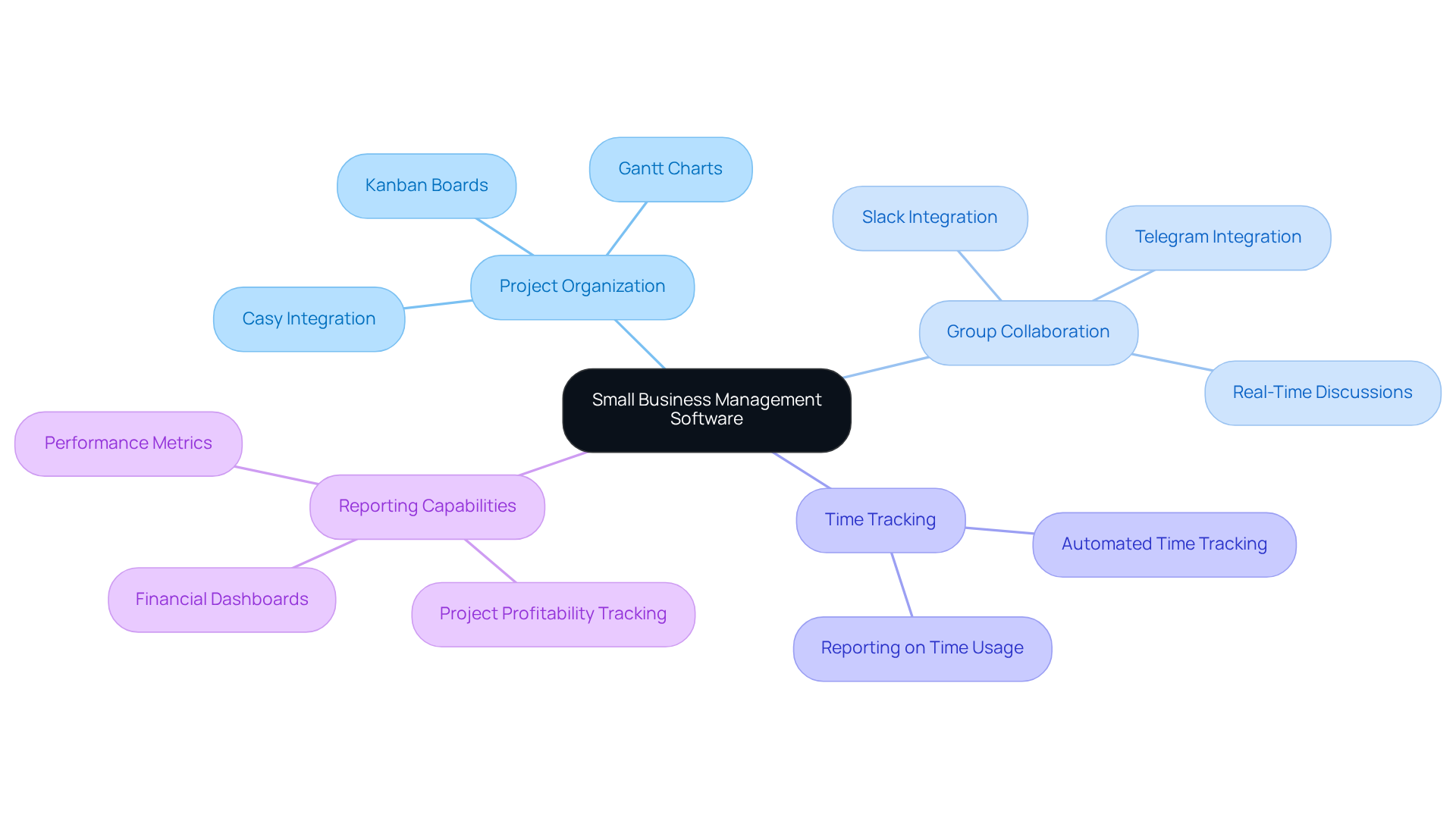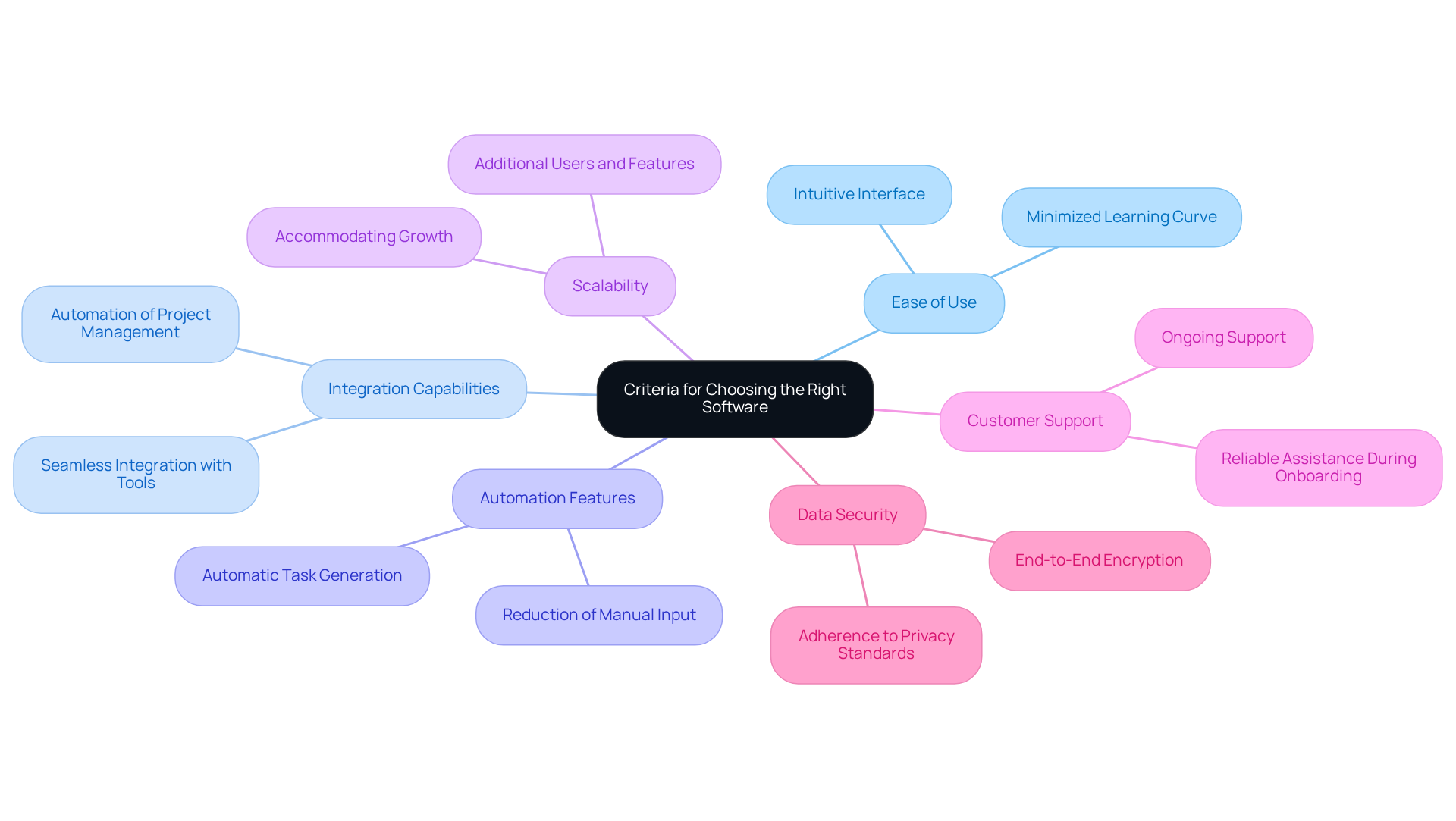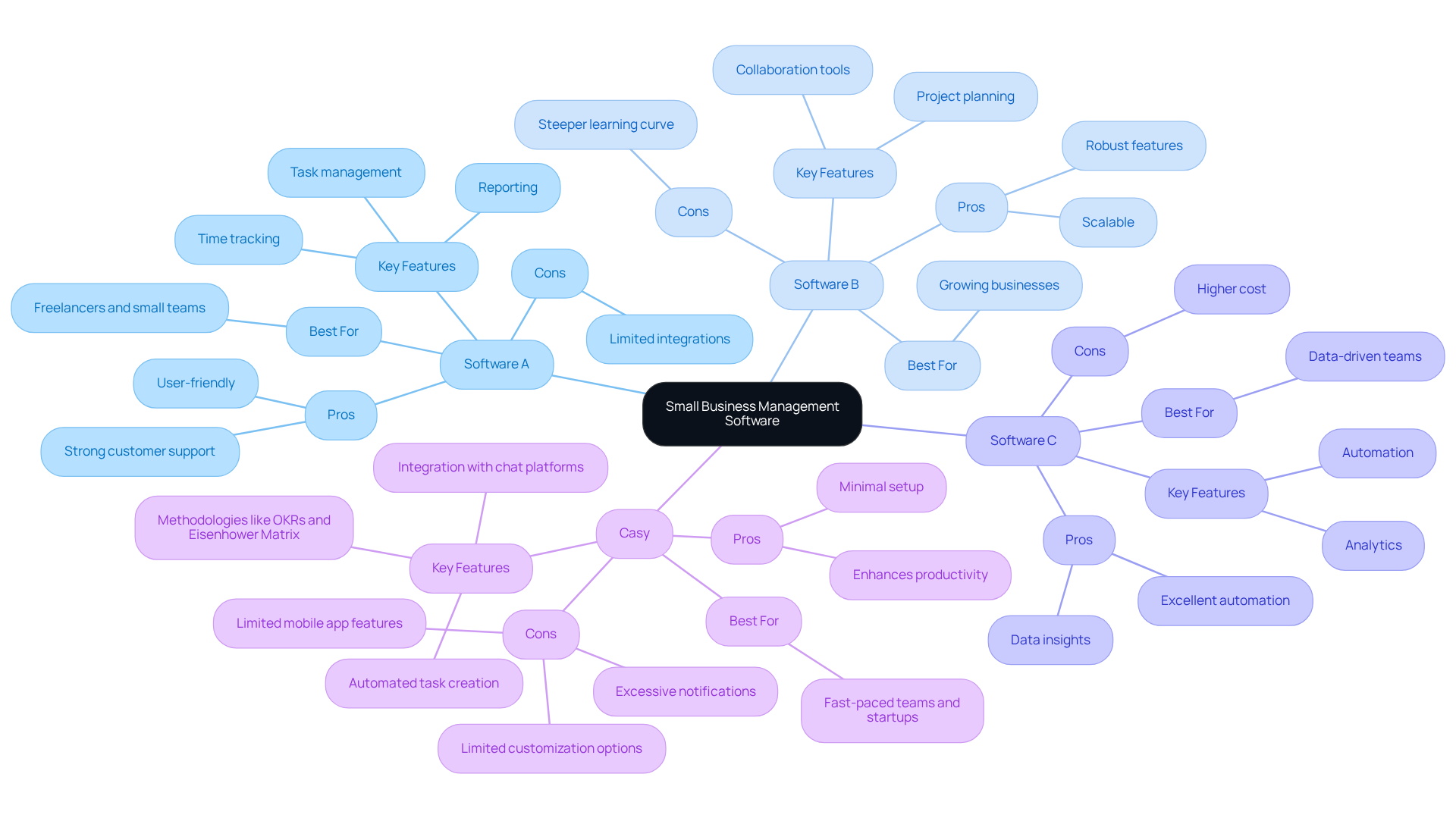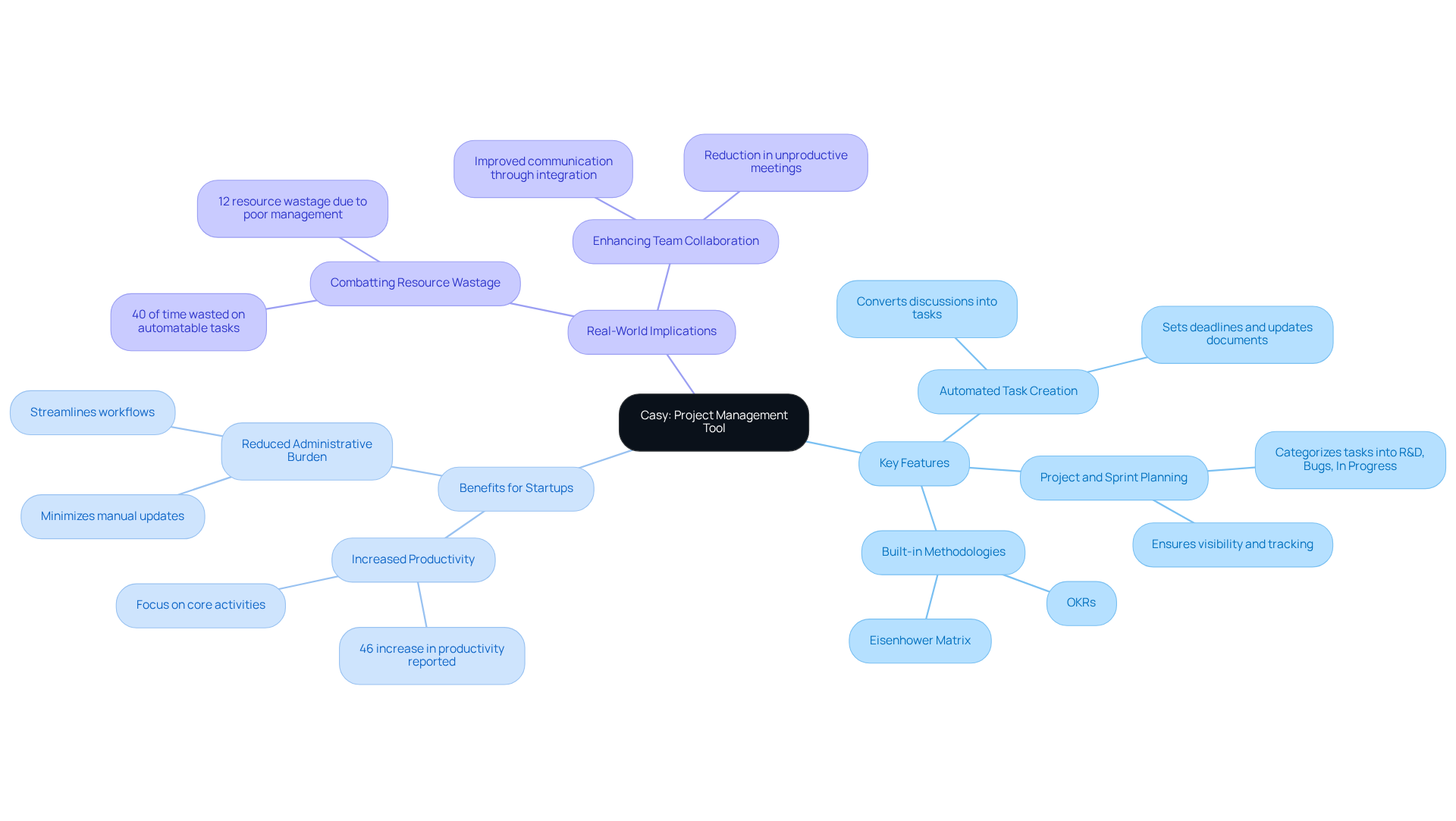Overview
This article provides a comparative analysis of the best small business management software, concentrating on their features, advantages, and disadvantages to assist businesses in choosing the most appropriate tool. It highlights key criteria such as:
- Ease of use
- Integration capabilities
- Automation features
Notably, effective software like Casy can significantly boost productivity by automating task management and streamlining workflows for teams. By understanding these aspects, startup founders can make informed decisions that enhance their operational efficiency.
Introduction
In an increasingly competitive landscape, small businesses are increasingly turning to management software to streamline operations and enhance productivity. These powerful tools not only facilitate project organization and team collaboration but also empower businesses to focus on innovation and growth.
However, with a plethora of options available, how can one determine which software truly meets their unique needs? This article delves into a comparative analysis of the best small business management software, exploring key features, benefits, and the critical criteria for making an informed choice that could redefine operational efficiency.
Understanding Small Business Management Software
The best small business management software includes a wide range of tools designed to optimize operations, manage projects, and elevate productivity. These platforms typically offer essential functions such as project organization, group collaboration, time tracking, and reporting capabilities. By alleviating administrative burdens, these tools significantly enhance workflow efficiency, allowing small businesses to focus on growth and innovation.
Consider Casy, a creative project coordination tool that seamlessly integrates with chat platforms like Slack and Telegram, automating work creation and updates. This functionality empowers teams to concentrate on critical tasks while reducing miscommunication and task overload. Did you know that 64% of projects delivered by AI innovators met or surpassed their initial ROI estimates? This statistic highlights the effectiveness of these tools in driving success.
Understanding the available functionalities is crucial for selecting software that aligns with a business's unique needs and operational style. As noted by PMI, streamlining operations through effective software can significantly boost productivity. AI-driven tools enable businesses to achieve higher project completion rates and improved ROI. Ultimately, choosing the best small business management software can transform how teams collaborate and execute projects, fostering a culture of efficiency and innovation.

Criteria for Choosing the Right Software
When selecting small business management software, several key criteria should be prioritized:
-
Ease of Use: An intuitive interface is essential to minimize the learning curve for team members. How quickly can your team adopt the software? A user-friendly design ensures effective utilization from the outset.
-
Integration Capabilities: The software must seamlessly integrate with existing tools such as Slack and Google Workspace. This integration facilitates smooth workflows and enhances collaboration. For instance, consider how the system connects with widely-used chat platforms to automate project management, capturing essential details from discussions.
-
Automation Features: Opt for software that automates repetitive activities. This significantly decreases manual input and administrative overhead, liberating valuable time for core business functions. The system exemplifies this capability by automatically generating assignments and updating documents based on chat discussions.
-
Scalability: Choose software that can grow alongside your business. Can it accommodate additional users and features as your needs evolve? Scalability is vital for long-term success.
-
Customer Support: Reliable customer service is crucial, particularly during the onboarding process. Strong support ensures a smooth transition and ongoing assistance. Insights from industry leaders emphasize the importance of having robust support during this critical phase.
-
Data Security: Adherence to data privacy standards is vital for protecting sensitive business information, especially in an era where data breaches are increasingly common. The organization's dedication to data privacy, encompassing end-to-end encryption, reassures users regarding the security of their information.
By focusing on these criteria, businesses can select the best small business management software that not only meets their current needs but also enhances future growth and efficiency.

Comparative Analysis of Top Small Business Management Software
Software Name | Key Features | Pros | Cons | Best For
--- | --- | --- | --- | ---
Software A | Task management, time tracking, reporting | User-friendly, strong customer support | Limited integrations | Freelancers and small teams
Software B | Project planning, collaboration tools | Robust features, scalable | Steeper learning curve | Growing businesses
Software C | Automation, analytics | Excellent automation, data insights | Higher cost | Data-driven teams
Casy | Automated task creation, integration with chat platforms, methodologies like OKRs and the Eisenhower Matrix | Minimal setup, enhances productivity | Limited customization options, excessive notifications, limited mobile app features | Fast-paced teams, startups
Casy sets itself apart by automating task management directly from chat conversations. This capability is particularly advantageous for teams that prioritize efficiency and seek to minimize operational overhead. Its seamless integration with popular chat platforms facilitates effective workflow coordination, alleviating the need for extensive manual input. With a G2 rating of 4.5 out of 5, Casy is well-regarded among users for its innovative approach to project management, addressing common pain points such as manual updates and coordination needs.
Pricing begins at approximately $26-$28 per user/month for the Essential plan, making it a competitive choice for startups and dynamic groups. This automation not only reduces administrative burden but also enhances overall productivity, allowing teams to focus on their core activities. Are you ready to streamline your task management and elevate your team's efficiency? Casy could be the solution you've been searching for.

Casy: A Unique Solution for Startup Project Management
This innovative project management tool serves as an unseen project manager, seamlessly integrating with communication platforms like Slack and Telegram. Its standout feature is the automation of assignment creation and updates derived from real-time discussions, significantly alleviating the administrative burden on teams. Key features include:
- Automated Task Creation: Casy converts chat discussions into actionable tasks without manual input, enabling teams to concentrate on their core activities.
- Project and Sprint Planning: Tasks are categorized into R&D, Bugs, and In Progress, ensuring complete visibility and facilitating efficient project tracking.
- Built-in Methodologies: The platform employs frameworks such as OKRs and the Eisenhower Matrix, assisting teams in effectively prioritizing their work.
The company's commitment to data privacy, featuring end-to-end encryption and stringent visibility controls, guarantees that user content remains secure. This focus on security, along with its automation capabilities, makes it particularly appealing for startups and teams operating in fast-paced environments that necessitate the best small business management software for effective project management without the complexities associated with traditional tools.
Consider the real-world implications: automated task creation in startups can combat the staggering statistic that the average business wastes 40% of their time on tasks ripe for automation. By leveraging this tool, teams can streamline their workflows, enhance productivity, and reduce coordination costs, ultimately allowing them to focus on innovation and growth. Notably, remote startups have reported a remarkable 46 percent increase in productivity, as evidenced by GitHub contributions, further highlighting the transformative impact of effective project management solutions like Casy.

Conclusion
Choosing the right small business management software is crucial for optimizing operations and enhancing productivity. By leveraging tools that streamline project organization, facilitate collaboration, and automate repetitive tasks, businesses can focus on growth and innovation. The insights provided throughout the analysis underscore the transformative potential of selecting the right software that aligns with a company's unique needs.
Key arguments highlighted include the importance of:
- User-friendly interfaces
- Integration capabilities
- Automation features
- Scalability
- Customer support
- Data security
Each of these criteria plays a vital role in ensuring that the chosen software not only meets current operational demands but also supports future growth. Casy, in particular, stands out for its innovative approach to project management, automating task creation and integrating seamlessly with popular communication platforms to enhance team efficiency.
In light of these findings, it is essential for small businesses to evaluate their specific needs and consider the long-term benefits of adopting robust management software. The right tools can significantly reduce administrative burdens, improve project completion rates, and foster a culture of collaboration and efficiency. As businesses navigate the evolving landscape, prioritizing effective management solutions like Casy can lead to remarkable productivity gains and ultimately drive success in a competitive market.
Frequently Asked Questions
What is small business management software?
Small business management software includes tools designed to optimize operations, manage projects, and enhance productivity. It typically offers functions like project organization, group collaboration, time tracking, and reporting capabilities.
How does small business management software improve workflow efficiency?
By alleviating administrative burdens, these tools enhance workflow efficiency, allowing small businesses to focus more on growth and innovation.
Can you give an example of a small business management tool?
Casy is an example of a creative project coordination tool that integrates with chat platforms like Slack and Telegram, automating work creation and updates to reduce miscommunication and task overload.
What impact do AI-driven tools have on project outcomes?
AI-driven tools can lead to higher project completion rates and improved ROI. In fact, 64% of projects delivered by AI innovators met or surpassed their initial ROI estimates.
Why is it important to understand the functionalities of small business management software?
Understanding the available functionalities is crucial for selecting software that aligns with a business's unique needs and operational style, ultimately boosting productivity.
What are the benefits of choosing the right small business management software?
The right software can transform how teams collaborate and execute projects, fostering a culture of efficiency and innovation within the organization.




